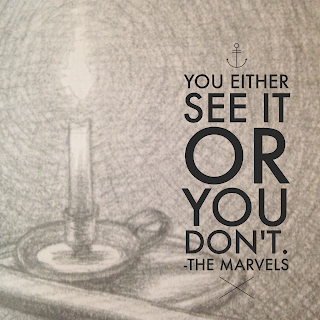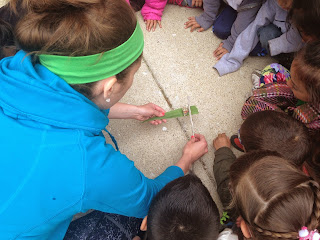I wanted The Marvels the second I heard @MrSchuReads talk about it. I think he had an early copy of it, because I went to Amazon right away and tried to buy it. No luck. A few months later, it popped back into my head again, so I ordered it. And it came. It was beautiful, with gold embossed pages too! That day, I say in the entryway to my house and read as many of the 400 pages of pure images for about half an hour before it became completely necessary to give my kids a bath. Brian Selznick has created his own genre that combines visual literacy with text.
I call it awesome.
I brought the book to school, showed it to some teachers, and then it sat on my shelf. Waiting. Waiting for life to calm down so that I could enjoy it fully.
A few weeks ago, I found my niece's copy of The One and Only Ivan, and I got incredibly excited. Abby is old enough to read books that I enjoy! The literacy coach in me couldn't help but go home and order her Crenshaw and The Marvels for Christmas. Crenshaw, because she loved Ivan, and The Marvels because I love it. Even though I hadn't read it... yet.
Then, finally, an ice storm hit Chicago. We are on winter break, and winter arrived in the form of sleet and ice and rain. There was no chance that I would head outside today. It was finally time to read The Marvels. Now that my niece has a copy of the book, what if she wants to talk about it? I felt driven to read it. Plus, we are reading with a Husky paw over break and tagging the pictures with #HiawathaReads. It seemed perfect.
So, this mom hid in her bedroom, covered in blankets and with a cup of hot cocoa, and read it from front to back. 672 pages or so in one day. There was a stop for lunch when my husband made us spaghetti, and a stop for a performance of the Nutcracker by my kids. At some point I also had to take some pictures of a LEGO creation for my son, because he wants to be in their magazine. And, there were sections of the book where my kids played around me as I continued to turn the pages. I was going to read this book.
And I did. And it is glorious. (So was my cocoa.)
I would love to tell you about the book, but I won't. Amazon calls it a narrative puzzle of pictures and prose. I think it is something that needs to just be read. But, if you read it, I'd love to talk to you about it. In case you wanted a sneak peek, here is a Vine made by Mr. Schu with a little preview:
https://vine.co/v/O0gDxF31DHT
The one thing I will mention is how much I love the message it sends about the impact books can have on us. I found this section of text early on, which was perfect since I was in a snowstorm of my own a few days after Christmas:
The character regularly got lost inside stories, quoting excerpts of famous books and carrying texts with him like his prized possessions. He spent a lot of time "lost inside stories" and on this wintery day it was easy to say that I did the same thing. Later in the text it quoted Twenty Thousand Leagues Under the Sea and said:
You will not regret the time you spend reading this book, in a land of Marvels.
When is the last time your students read like that in class?
The truth is, they usually don't. They usually read books that they enjoy, but stop and start and sometimes stop and never restart. So what makes the difference?
I think that the more we put ourselves into the role of readers ourselves, the more we can figure out the answer to that question.
I never once stopped to name a trait of any of the Marvels. Nor did I track his change over time, or compare them to characters in other novels. RL3
I never came up with a big theme in the book, and found key details to support that theme. RL2
I did stop and snap pictures of some favorite quotes alone the way, so I was on my way to analyzing the craft of the book. But, that would be a stretch. RL 4 and 5
I wished I could compare it to Hugo, but I left that in my office at school. No RL 9 today.
I guess my point is this:
While I did not specifically do any standards work today, I could certainly do any of those standards if I was put into a conversation with someone about The Marvels. I might have to refer back to the text, or think about it a little before I respond, but I can do it. Since I have been taught those strategies already, I can apply them to any book I read. But, that doesn't mean that every book I read needs to be picked apart and reduced to standards work to prove that I read. Trust me, I read that book. My kids are relieved that I finished, in fact. :)
Sometimes, readers need to read for the enjoyment of it.
I was thinking these thoughts, because I think sometimes as a literacy coach people think that I will be happy if the Common Core standards are always front and center, and that the kids are showing their ability to do them. BUT... I think that first and foremost we need to have kids who consider themselves READERS. Kids who know the standards today, and USE them as they grow into adult readers. The standards make students think critically, and those critical thoughts will help them living in the world, both in books and in the actual world. But, if learning the standards means reading is always a chore, will they actually continue to read on their own?
I was debating this post, and then I jumped into a #learnLAP Twitter chat and this tweet by @Kevreaddenn made me think, "YES!!!"
BALANCE. We need to teach them how to read deeply, but also how to love reading deeply.
If you are looking for a book to enjoy, I do suggest The Marvels. :)
It's glorious.
If you want to let your kids love reading and escape into the world of a book, let them do just that. Let them just read sometimes.



















































